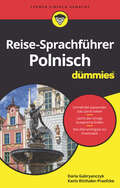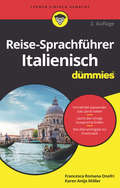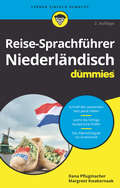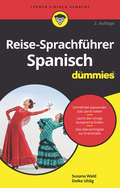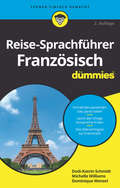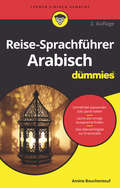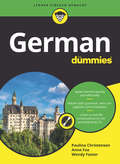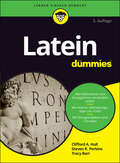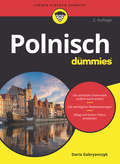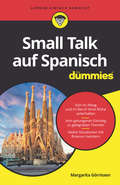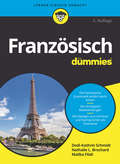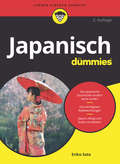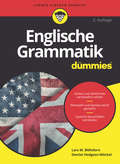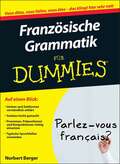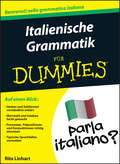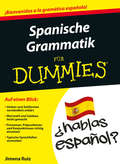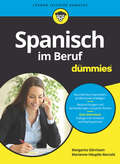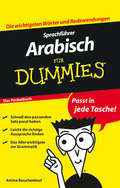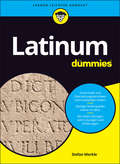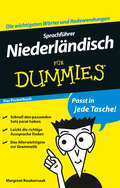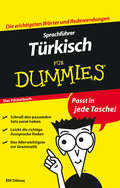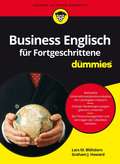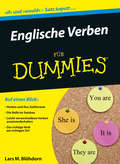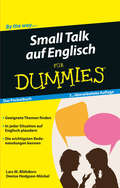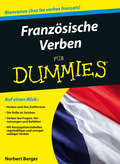- Table View
- List View
Reise-Sprachführer Polnisch für Dummies (Für Dummies)
by Daria GabryanczykDer "Reise-Sprachführer Polnisch für Dummies" bietet einen schnellen à berblick über die wichtigsten Wörter und Redewendungen für den Reise-Alltag. Jedes Kapitel beschäftigt sich mit einer typischen Situation. So haben Sie schnell die passenden Sätze parat, wenn Sie sich beispielsweise jemandem vorstellen, im Restaurant bestellen oder nach einer Wegbeschreibung fragen. Dazu bekommen Sie eine kurze Einführung in die Grammatik und Aussprache des Polnischen.
Reise-Sprachführer Italienisch für Dummies (Für Dummies)
by Francesca Romana Onofri Karen Antje MöllerDer "Reise-Sprachführer Italienisch für Dummies" bietet einen schnellen Überblick über die wichtigsten Wörter und Redewendungen für den Reise-Alltag. Jedes Kapitel beschäftigt sich mit einer typischen Situation. So haben Sie schnell die passenden Sätze parat, wenn Sie sich beispielsweise jemandem vorstellen, im Restaurant bestellen oder nach einer Wegbeschreibung fragen. Dazu bekommen Sie eine kurze Einführung in die Grammatik und Aussprache des Italienischen.
Reise-Sprachführer Niederländisch für Dummies (Für Dummies)
by Margreet Kwakernaak Dana PflugmacherMit dem "Reise-Sprachführer Niederländisch für Dummies" sind Sie für Gespräche auf Reisen in den Niederlanden gerüstet: ob Sie im Supermarket in Den Haag einkaufen, in Amsterdam in einem Restaurant eine Mahlzeit bestellen oder in Rotterdam ein Hotel reservieren. Hier finden Sie die passenden Sätze für die jeweilige Situation. Ganz nebenbei erfahren Sie das Wichtigste über die niederländische Grammatik und bekommen viele Tipps für die richtige Aussprache.
Reise-Sprachführer Spanisch für Dummies (FÜr Dummies)
by Susana WaldMit diesem Büchlein sind Sie für kurze Gespräche auf Spanisch gerüstet: ob Sie im Supermarket in Madrid einkaufen, in Barcelona in einer Bar Tapas bestellen oder in Granada über das Wetter plaudern. Hier finden Sie die passenden Sätze für die jeweilige Situation. Ganz nebenbei erfahren Sie das Wichtigste über die spanische Grammatik und bekommen viele Tipps für die richtige Aussprache.
Reise-Sprachführer Französisch für Dummies (FÜr Dummies)
by Michelle M. Williams Dodi-Katrin Schmidt Dominique Wenzel"Sprachführer Französisch für Dummies" bietet einen schnellen Überblick über die wichtigsten Wörter und Redewendungen für den Alltag. Jedes Kapitel beschäftigt sich mit einer Alltagssituation. So haben Sie schnell die passenden Sätze parat, wenn Sie sich beispielsweise jemandem vorstellen, im Restaurant bestellen oder nach einer Wegbeschreibung fragen. Dazu bekommen Sie eine kurze Einführung in die Grammatik und Aussprache des Französischen.
Reise-Sprachführer Arabisch für Dummies (FÜr Dummies)
by Amine Bouchentouf"Sprachführer Arabisch für Dummies" bietet einen schnellen Überblick über die wichtigsten Wörter und Redewendungen für den Alltag. So haben Sie schnell die passenden Sätze parat, wenn Sie sich jemandem vorstellen, im Restaurant bestellen oder nach einer Wegbeschreibung fragen. Dazu bekommen Sie eine kurze Einführung in die Grammatik und die Aussprache des Arabischen.
German für Dummies (Für Dummies)
by Paulina Christensen Anne Fox Wendy Forster"German für Dummies" bietet einen leichten Einstieg in die deutsche Sprache. Das Buch ist in Englisch geschrieben. Hier lernen Sie alles Wissenswerte zur Grammatik und zur Konjugation der Verben. Mit kleinen Übungen können Sie das Erlernte festigen. Im Mini-Wörterbuch finden Sie die wichtigsten Vokabeln. Und die beiliegende CD mit Dialogbeispielen aus dem richtigen Leben hilft Ihnen, die Aussprache zu erlernen.
Latein für Dummies (Für Dummies)
by Clifford A. Hull Steven R. Perkins Tracy L. BarrLatein lernen einmal anders. Die Autoren von "Latein für Dummies" zeigen Ihnen, wie man mit Spaß Latein lernen, auffrischen oder verbessern kann. Zwischen Konjugationen und Deklinationen erfahren Sie viel über die römische Gesellschaft, Literatur und über das, was Latein auch heute noch für uns interessant macht. Mit einem kleinen Wörterbuch und vielen Konjugations- und Deklinationstabellen sowie Übungen samt Lösungen ist dies der ideale Einsteiger- und Auffrischungskurs für die Lateiner von morgen.
Polnisch für Dummies (Für Dummies)
by Daria GabryanczykMit diesem Buch lernen Sie Polnisch. Neben der Betonung und der Grammatik lernen Sie Redewendungen und Begriffe, mit denen Sie Alltagssituationen meistern: sich auf Polnisch vorstellen, über Ihre Hobbys sprechen oder einen Tisch in einem Restaurant reservieren. Nebenbei lernen Sie die polnische Kultur kennen und bekommen Tipps für das Leben in Polen. Am Ende eines jeden Kapitels gibt es kleine Übungen, mit denen Sie Ihre erworbenen Sprachfähigkeiten leicht prüfen können. Dem Buch liegt eine CD mit Übungen zum Hören und Nachsprechen bei.
Small Talk auf Spanisch für Dummies (Für Dummies)
by Margarita GörrissenBei Tapas und einem guten Rioja entspannt ins Gespräch kommen? Im Beruf durch nette Plauderei eine entspannte Atmosphäre schaffen? Bei einer Einladung die richtigen Begrüßungsworte finden? Mit diesem Buch gelingt es Ihnen! Lernen Sie spanische Vokabeln und Redewendungen für den Small Talk kennen. Erfahren Sie, welche Themen in Spanien oder Lateinamerika small-talk-tauglich sind und welche nicht. Lassen Sie sich Techniken zeigen, mit denen Sie ein Gespräch beginnen, aufrechterhalten und beenden. Und haben Sie vor allem eines: jede Menge Spaß beim Small Talk!
Französisch für Dummies (Für Dummies)
by Michelle M. Williams Dodi-Katrin Schmidt Malika Filali Nathalie L. Brochard"Französisch für Dummies" bietet einen leichten und unterhaltsamen Einstieg in die französische Sprache. Zunächst verraten die Autoren, wie Sie französische Wörter richtig aussprechen und betonen und führen Sie auch in die Grundlagen der französischen Grammatik ein. Dann wird es praktisch, denn jedes Kapitel beschäftigt sich mit einer Alltagssituation: Sie lernen, wie Sie sich auf Französisch vorstellen, im Restaurant bestellen oder nach dem Weg fragen. Sie finden sich in einer typischen Büroumgebung wieder und vereinbaren Termine, mieten eine Wohnung an oder buchen eine Flugreise. Aber auch Ihre Freizeit kommt nicht zu kurz: Sie gehen mit Freunden aus, kaufen ein, sprechen über Ihre Hobbys und machen Sport. Dabei nehmen Sie immer die jeweils wichtigsten Sätze, Umschreibungen und Begriffe auf und erhalten nebenbei viele Informationen zum Alltag und zur Kultur in Frankreich. Am Ende jedes Kapitels gibt es kleine Übungen, mit denen Sie Ihre erworbenen Sprachkenntnisse prüfen können. Im Anhang des Buches finden Sie Verbtabellen und ein kleines Französisch-Deutsch-/Deutsch-Französisch-Wörterbuch. Auf der beiliegenden CD gibt es die Dialoge aus dem Buch zum Anhören und Nachsprechen.
Japanisch für Dummies (Für Dummies)
by Eriko SatoSie haben angefangen, Japanisch zu lernen, haben regelmäßig Kontakt zu japanischen Geschäftspartnern oder wollen Ihren Urlaub in Japan verbringen? In diesem Buch erfahren Sie alles über die Besonderheiten der Sprache, erhalten eine kurze Einführung in Betonung und Grammatik und lernen anhand von vielen typischen Alltagssituationen Japanisch zu sprechen. So können Sie sich nicht nur auf Japanisch vorstellen und Small Talk betreiben, sondern bekommen auch beim Einkaufen und im Restaurant das, was Sie wollen. Mit der CD zum Buch können Sie viele Sprachübungen anhören und nachsprechen.
Englische Grammatik für Dummies (Für Dummies)
by Denise Hodgson-Möckel Lars M. BlöhdornSie wollen - oder müssen - Englisch sprechen und wollen auch verstanden werden? Sie möchten E-Mails auf Englisch verfassen oder bereiten sich gar auf den TOEFL vor? Dann ist dieses Buch genau das richtige für Sie: Lars Blöhdorn, Dozent der Sprachwissenschaften, und Denise Hodgson-Möckel, Dozentin und Muttersprachlerin, erklären Ihnen locker, witzig und leicht verständlich auch die kompliziertesten Regeln der englischen Sprache.
Französische Grammatik für Dummies (Für Dummies)
by Norbert BergerSteht der nächste Test an, haben Sie französische Kollegen, mit denen Sie sich austauschen wollen, oder möchten Sie in Ihrem Frankreichurlaub mehr als einfach nur "merci" sagen können? Grammatik ist nicht jedermanns Sache und die französische Grammatik macht es einem auch nicht immer leicht. Norbert Berger unterrichtet seit vielen Jahren Französisch. Er kennt die Nöte der Lernenden und die Fallen der französischen Grammatik, in die sie häufig hineintappen. Leicht verständlich, mit einer Prise Humor und anhand vieler Beispiele und Informationen zu Land und Leuten erklärt er alles über Artikel und Pronomen, Adjektive und Adverbien, Fragestellung und Verneinung, die Zeiten und die Satzstellung. Am Ende eines jeden Kapitels gibt es Übungen, die das Gelernte noch einmal wiederholen. Tabellen der wichtigsten französischen Verben bieten ganz Eiligen alle Konjugationen auf einen Blick. So sind Sie für den nächsten Test gerüstet, können mit Ihren französischen Kollegen über zukünftige Projekte sprechen oder einfach nur unbeschwert im Frankreichurlaub parlieren.
Italienische Grammatik für Dummies (Für Dummies)
by Rita LinhartSteht der nächste Test an, haben Sie italienische Kollegen, mit denen Sie sich austauschen wollen, oder möchten Sie in Ihrem Italienurlaub mehr als einfach nur "Grazie" sagen können? Grammatik ist nicht jedermanns Sache und die italienische Grammatik macht es einem auch nicht immer leicht. Rita Linhart kennt die Nöte der Lernenden und die Fallen der italienischen Grammatik, in die sie häufig hineintappen. Leicht verständlich, mit einer Prise Humor und anhand vieler Beispiele und Informationen zu Land und Leuten erklärt sie alles über Artikel und Pronomen, Adjektive und Adverbien, Fragestellung und Verneinung, die Zeiten und die Satzstellung. Am Ende eines jeden Kapitels gibt es Übungen, die das Gelernte noch einmal wiederholen. Tabellen der wichtigsten italienischen Verben bieten ganz Eiligen alle Konjugationen auf einen Blick. So sind Sie für den nächsten Test gerüstet, können mit Ihren italienischen Kollegen über zukünftige Projekte sprechen oder einfach nur unbeschwert im Italienurlaub parlieren.
Spanische Grammatik für Dummies (Für Dummies)
by Jimena RuizMit Übungsaufgaben samt Lösungen und Konjugationstabellen der wichtigsten Verben Grammatik ist nicht jedermanns Sache und die spanische Grammatik macht es einem auch nicht immer leicht. Jimena Ruiz unterrichtet seit vielen Jahren Spanisch. Sie kennt die Nöte der Lernenden und die Fallen der spanischen Grammatik, in die sie häufig hineintappen. Leicht verständlich, mit einer Prise Humor und anhand vieler Beispiele und Informationen zu Land und Leuten erklärt sie alles über Artikel und Pronomen, Adjektive und Adverbien, Fragestellung und Verneinung, die Zeiten und die Satzstellung. Am Ende eines jeden Kapitels gibt es Übungen, die das Gelernte noch einmal wiederholen. Tabellen der wichtigsten spanischen Verben bieten ganz Eiligen alle Konjugationen auf einen Blick. So sind Sie für den nächsten Test gerüstet, können mit Ihren spanischen Kollegen über zukünftige Projekte sprechen oder einfach nur unbeschwert im Spanienurlaub parlieren.
Spanisch im Beruf für Dummies (Für Dummies)
by Margarita Görrissen Marianne Häuptle-BarcelóSie müssen auf Spanisch mit Ihren Kollegen, Kunden und Geschäftspartnern kommunizieren? Wenn Sie dieses Buch gelesen haben, werden Sie entspannt Telefongespräche auf Spanisch führen und Geschäftskorrespondenz jeglicher Art auf Spanisch verfassen. Sie erfahren, wie Sie sich bei Besprechungen und Verhandlungen von Ihrer besten Seite zeigen und lernen den Small Talk beim Networking zu beherrschen. Die Autorinnen geben Ihnen Tipps, nennen Ihnen die wichtigsten Redewendungen und erläutern kulturelle Gepflogenheiten in Spanien und Lateinamerika. So tauchen Sie ganz leicht in die spanischsprachige Geschäftswelt ein.
Sprachführer Arabisch für Dummies Das Pocketbuch (Für Dummies)
by Amine Bouchentouf"Sprachführer Arabisch für Dummies" bietet einen schnellen Überblick über die wichtigsten Wörter und Redewendungen für den Alltag. So haben Sie schnell die passenden Sätze parat, wenn Sie sich jemandem vorstellen, im Restaurant bestellen oder nach einer Wegbeschreibung fragen. Dazu bekommen Sie eine kurze Einführung in die Grammatik und die Aussprache des Arabischen.
Latinum für Dummies (Für Dummies)
by Stefan MerkleGehören auch Sie zu den Studierenden, die an der Uni das Latinum nachholen müssen, weil es eine Voraussetzung für Ihren Abschluss ist, Sie aber in der Schule Latein nicht belegt hatten? Da gibt es sicher Angenehmeres. Aber wenn Sie schon im Lateinkurs sitzen, sollte das Lernen zumindest Spaß machen. Dieses Buch bereitet Sie auf die Klausur vor und hilft Ihnen, sie zu bestehen, auch wenn Sie zuvor keine Lateinkenntnisse hatten. Schritt für Schritt führt Stefan Merkle Sie in die lateinische Grammatik ein. Der Autor weiß, wo es hakt und welche grammatischen Formen besonders knifflig sind. Er vermittelt Übersetzungstechniken und weist Sie auf die häufigsten Fehlerquellen hin. Und nach den nachvollziehbaren Erklärungen heißt es dann üben, üben, üben - getreu dem Motto von null bis Caesar!
Sprachführer Niederländisch für Dummies Das Pocketbuch (Für Dummies)
by Margreet KwakernaakMit diesem Büchlein sind Sie für kurze Gespräche auf Niederländisch gerüstet: ob Sie im Supermarket in Den Haag einkaufen, in Amsterdam in einem Restaurant eine Mahlzeit bestellen oder in Scheveningen ein Hotel reservieren. Hier finden Sie die passenden Sätze für die jeweilige Situation. Ganz nebenbei erfahren Sie das Wichtigste über die niederländische Grammatik und bekommen viele Tipps für die richtige Aussprache.
Sprachführer Türkisch für Dummies Das Pocketbuch (Für Dummies)
by Elif DilmaçMit diesem Büchlein sind Sie für kurze Gespräche auf Türkisch gerüstet: ob Sie in Antalya im Supermarkt einkaufen, in Istanbul im Basar feilschen oder in Izmir im Restaurant etwas bestellen. Hier finden Sie die passenden Sätze für die jeweilige Situation. Ganz nebenbei erfahren Sie das Wichtigste über die türkische Grammatik und bekommen viele Tipps für die richtige Aussprache.
Business Englisch für Fortgeschrittene für Dummies (Für Dummies)
by Dr. Lars M. Blöhdorn Graham J. HowardEnglisch spielt im Berufsalltag vieler eine immer größere Rolle. Da genügt es oft nicht mehr, sicher auf Englisch telefonieren und korrespondieren zu können. Wenn Sie in der Corporate World sicher mit Englisch umgehen müssen, ist »Business Englisch für Fortgeschrittene für Dummies« das richtige Buch für Sie. Zunächst geht es um die Außendarstellung des Unternehmens und die internationale Unternehmenskommunikation. Es werden Vokabular, Satz- und Textbeispiele für den Handel auf dem Weltmarkt präsentiert und interkulturelle Aspekte betrachtet. Die Rolle des Englischen im internationalen Finanzmanagement nimmt einen weiteren wichtigen Teil ein. Hier geht es um Angebotsgestaltung und Rechnungslegung, Kreditbedingungen, Investmentvoraussetzungen, aber auch um Steuern, Dividenden sowie Buchhaltung und Geschäftsberichte. Die Autoren gehen auch auf rechtliche Aspekte im internationalen Umfeld ein. Sie behandeln Geschäftsbedingungen, Vertragsgestaltung, Konfliktmanagement in interkulturellen Settings, aber auch Fragen der Nachhaltigkeit und nicht zuletzt das Thema Mergers & Acquisitions. Viele Bespielformulierungen geben Ihnen Sicherheit, auch komplexere Sachverhalte zu verstehen und bei wirtschaftlichen Sachthemen mitreden zu können.
Englische Verben für Dummies (Für Dummies)
by Dr. Lars M. BlöhdornDie englischen Verben haben es in sich. Wann wird ein -s angehängt und wann ein -ed? Wie war das noch mal mit if und would? Und welche Unterschiede bei den Verben gibt es zwischen britischem und amerikanischem Englisch? Lars Blöhdorn macht es Ihnen leicht, dort einzusteigen, wo es für Sie die größten Stolpersteine gibt. Leicht verständlich und mit der üblichen Prise Humor erläutert er die Bildung von Zeiten, Konditionalsätzen, Passivformen und indirekter Rede. Und schon verlieren diese grammatischen Ungetüme ihren Schrecken. Sie erfahren, wie Sie zusammengesetzte Verben richtig verwenden, welche idiomatischen Ausdrücke Sie kennen sollten, wie neue Verben gebildet werden und was in der Alltagssprache wichtig ist. Dank der Übungen am Ende eines jeden Kapitels können Sie Ihre Lernfortschritte schnell überprüfen.
Small Talk auf Englisch für Dummies (Für Dummies)
by Denise Hodgson-Möckel Dr. Lars M. BlöhdornSie kommunizieren in Ihrem Beruf mit Geschäftspartnern aus anderen Ländern? Sie reisen viel und wollen ein paar Sätze parat haben, um mit Menschen auf Englisch in Kontakt zu treten? Das Pocketbuch »Small Talk auf Englisch für Dummies« hilft Geschäftsleuten und Reisenden, Small Talk auf Englisch über verschiedene Themen zu betreiben und dabei Kommunikationsklippen gekonnt zu umschiffen. Lars M. Blöhdorn und Denise Hodgson-Möckel bieten Ihnen verständlich formulierte Hinweise, praxisorientierte Beispiele und nützliche Hintergrundinformationen - damit wird Small Talk auf Englisch zum Kinderspiel.
Französische Verben für Dummies (Für Dummies)
by Norbert BergerVom Unmöglichen und Möglichen bis zum Blick in die Zukunft Grammatik ist nicht jedermanns Sache und die Konjugation der französischen Verben macht es einem auch nicht immer leicht. Norbert Berger kennt die Nöte der Lernenden und die Tücken der französischen Verben bestens. Leicht verständlich, mit einer Prise Humor und anhand vieler Beispiele erklärt er alles über die verschiedenen Zeiten, das Konditional, den Subjonctif, den Imperativ, Fragestellung und Verneinung. Am Ende eines jeden Kapitels gibt es Übungen, die das Gelernte noch einmal wiederholen. Konjugationstabellen der wichtigsten französischen regelmäßigen und unregelmäßigen Verben bieten Ihnen einen guten Überblick. So sind Sie für den nächsten Test bestens gerüstet.
